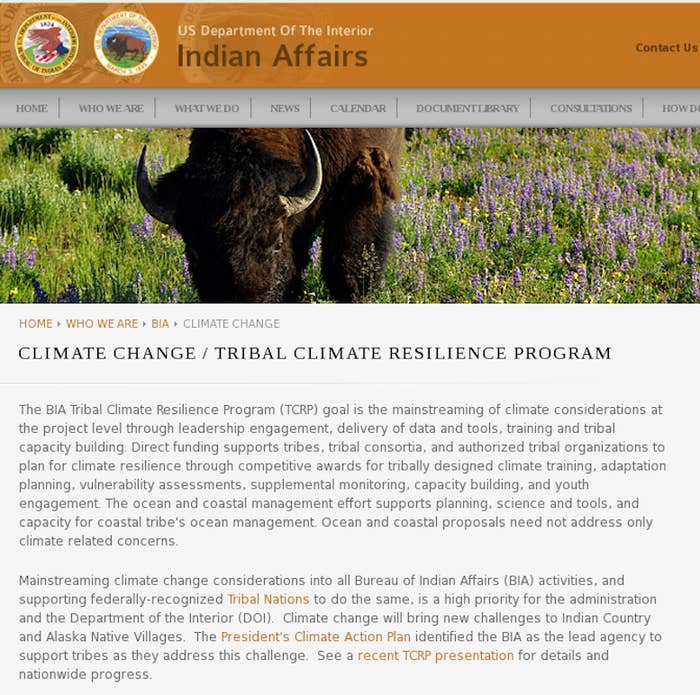
As tribal nations across the US commit to climate action and the Paris Agreement, the Bureau of Indian Affairs has removed references to “climate” and “climate change” from the website that anchors the agency’s efforts in this space.
The BIA, a bureau within the Interior Department, oversees the management of lands and programs for 567 federally recognized tribes. The Tribal Climate Resilience Program is one of several agency programs that fund and empower tribal nations to study climate change impacts, and to develop ways to prepare their communities to survive them.
But sometime in the last month, the programs website's language changed. Now it’s called the “Tribal Resilience Program,” and the only remaining reference to climate change is in its URL.
“Tribal communities are particularly vulnerable to climate change, so I think they will be displeased that the administration is trying to deny that there is such a thing,” Kevin Washburn, a law professor at the University of New Mexico who oversaw the BIA as Assistant Secretary for Indian Affairs at the Interior Department from 2012 to 2015, told BuzzFeed News. “Trying to erase its existence from the public record is short-sighted.”
The Bureau of Indian Affairs did not immediately respond to requests for comment.

A previous version of the website stated that “[m]ainstreaming climate change considerations into all Bureau of Indian Affairs activities and supporting federally-recognized Tribal Nations to do the same is a high priority for the administration and the Department of Interior.” This text is no longer displayed on the page.
The past version of the website also noted that the BIA was the agency tapped to lead climate efforts for tribes, per President Obama’s landmark Climate Action Plan of 2013. The Trump Administration’s proposed 2018 budget for the BIA would eliminate $9.9 million in Tribal Climate Resilience awards.
The page still links to climate impact resources, but those have also been fine-tuned. For example, a portal to the National Climate Assessment is now labeled “Third National Assessment,” while a link to the National Institute of Environmental Health Sciences page describing the impact of climate change on health is now titled “Resilient Health.”
These changes are consistent with adjustments to other agency websites mirroring the rhetoric of Environmental Protection Agency Director Scott Pruitt and Interior Secretary Ryan Zinke who, among others, have disconnected climate effects and human activities. The State Department slimmed down references to US leadership on climate action on the website of the agency’s primary climate office, the Office of Global Change. The Department of Energy’s main climate website removed links to resources on the issue, and references to US emissions levels were also deleted from the department's webpage for kids. In a more drastic move, the EPA took down its primary climate webpages for updates, although links to archived versions of the site are still available.
Environmental representatives of tribal nations are already concerned about continued support and funding for such programs.
Following President Trump’s June 1 announcement that the US would withdraw from the Paris Agreement, four tribal nations pledged to adhere to the accord.
“Regardless of the official position of the United States administration, we will continue to stand together in agreement with the Paris Climate Change Agreement,” Standing Rock Sioux chairman, David Archambault, said in a statement. Co-signatory Brian Cladoosby, chairman of the Swinomish Indian Tribal Community added that “We can no longer allow a failed system to continue to destroy the planet. The Paris Climate Change Agreement reflects the global consensus that we must act together and we must act now.” The Quinault Indian Nation and the Central Council of the Tlingit and Haida Indian Tribes of Alaska were cosignatories of this announcement.
The top political and legal groups representing indigenous rights in the US also split from the administration’s message on climate change. In a statement noting that “as many as 184 Alaska Native villages are threatened with removal due to climate-based changes,” the National Congress of American Indians and the Native American Rights Fund called Trump’s decision to quit the Paris Agreement “disappointing news,” and said indigenous groups and nations “remain firmly committed to representing and advancing Indigenous peoples’ interests in the ongoing process of implementing the Agreement.”
“The effects are only getting worse,” the groups said.
Zahra Hirji contributed reporting to this story.
CORRECTION
A link to the National Institute of Environmental Health Sciences page describing the impact of climate change on health is now titled “Resilient Health.” A previous version of this post misstated the name of the agency.
CORRECTION
President Trump announced the intention of the US to withdraw from the Paris Agreement on June 1. A previous version of this post misstated the date of his announcement.
